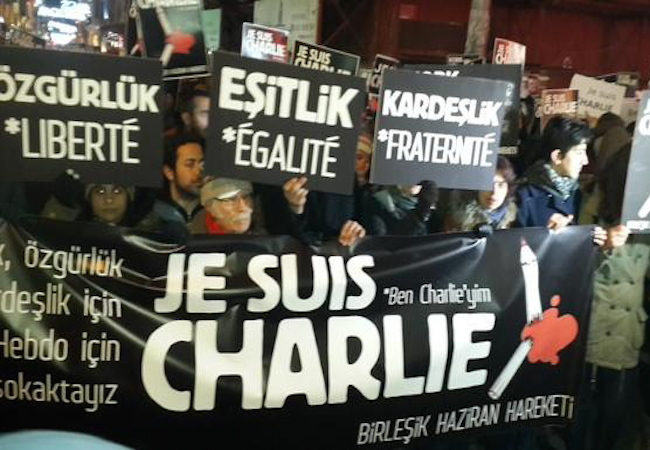New conflict, same old mistakes: France and cartoon controversy

By Try Ananto Wicaksono
Once again, The French satirical newspaper Charlie Hebdo republish controversial cartoons of the Prophet Muhammad. The aim to mark the start of a trial of suspected accomplices of the terrorist gunman who attacked Charlie Hebdo offices in January 2015 but turns out its sparking anger across the Islamic world.
Charlie Hebdo is a satirical weekly magazine that publishes in France, self-defining as a “secular, political and jubilant” periodical that “draws, writes, interviews ponders and laughs at everything on this earth, which is ridiculous, giggles at all that is absurd or preposterous in life”. The first cover that shows cartoons of the Prophet Muhammad published in the Danish daily Jyllands-Posten newspaper in 2005. These were reprinted by Charlie Hebdo in 2006.
Widely reported across global media, Charlie Hebdo’s cartoons have been variously interpreted as contentious provocations toward Islam which disregard iconographic norms and thereby ride roughshod over Muslim cultural sensitivities, and/or for depicting Islam in crude, stereotypical, and offensive. In contrast, other commentators have applauded the magazine, viewing these cartoons as the expression of universal civic rights of free speech, secularism, and equality.
Laïcité is France’s principle of secularism means that the State and religious organizations are separate. In France, freedom of expression is considered a universal right, while in some countries, even in Israel were unable to offending religious sentiments. The law prohibits illustrating Moses, Jesus, or Mohammed in a way that would hurt the feelings of believers. To the French, this also seems strange because laws limiting freedom of speech were taken off the books at the end of the 18th century. President Emmanuel Macron said “There is in France a freedom to blaspheme which is attached to the freedom of conscience. I am here to protect all these freedoms. In France, one can criticize a president, governors, blaspheme,”
The response to the Charlie Hebdo attack has raised the need to better define and articulate what we mean by freedom of expression. Several fundamental misconceptions and blind spots in the discussion on freedom of speech and its limitations have been exposed and require clarification or refutation.
The idea of extending anti-vilification laws to cover religious groups runs into conflict with an extremist view of laïcité. This view sees the principle of laïcité not as a separation between religion and state, but as state-endorsed secularism. Previously, Gérard Biard as Charlie Hebdo’s editor-in-chief, said in 2012 that Charlie Hebdo was an atheist paper, a secularist paper”. He argues that people should recognize that laïcité is perhaps the prime moral value of our Republic and without it, Liberté, Égalité, and Fraternité isn’t possible.
French sociologist and political scientist, Vincent Geisser, explained that Charlie Hebdo is only looking to impose its secular purity by treating everyone else as fanatics”. Charlie Hebdo’s satirizing of Islam in the name of their view of laïcité is, thus, a part of a very real attack not only on religion as an institution but also on people’s right to religious freedom.
Geisser’s argument can understand that laïcité stands in direct contradiction to the idea of freedom of religion expressed in The United Nations recognized the importance of freedom of religion or belief in the 1948 Universal Declaration of Human Rights (Universal Declaration), Article 18 of which states “Everyone shall have the right to freedom of thought, conscience, and religion. This right shall include freedom to have a religion or whatever belief of his [her] choice.”.
Based on Qur’an itself does not contain a prohibition on images of Mohammed being shown. However, Mohammed is a venerated figure among Muslims, who often perceive cartoons and other material critical of him as such an attack on their Muslim identity. Hence, the principle of laïcité, as expressed by Charlie Hebdo’s editor, is not compatible with a human rights approach that respects individual freedoms, including freedom of religion. The incompatibility should be more obvious; the fact that it is not pointing to a shortcoming in approach to anti-vilification principles.
The purpose of laws against vilification is to protect the human dignity of individuals. On this basis, criticism of a religious belief must be permitted, but interference with an individual’s right to hold a belief, or to practice their religion, can be prohibited. The distinction can be seen by considering its application to cartoons of Mohammed in more detail.
In general, Freedom of speech is presented as the most significant Western value and the heart of democracy. To sum up, it is a reminder that secular Europeans have their own identity politics, and that these play out in controversies over cartoons, as well. However, insulting Muslims, offending their religious feelings, and vilifying Islam are not just words; it might trigger emotions of extreme dislike, which eventually leads to another conflict. The key is to respect others to get respected. Treat people with respect if you want to be respected.
Try Ananto Wicaksono is a student with two master’s degrees programs in Business Law and Public Policy from Gadjah Mada University (UGM) and School of Government and Public Policy (SGPP) – Indonesia respectively. He also Alumni of Institute for Development of Economics and Finance (INDEF) School of Political Economy (ISPE) Batch 2020. His interest in International Political Economy, International Economic Law and Human Rights.




